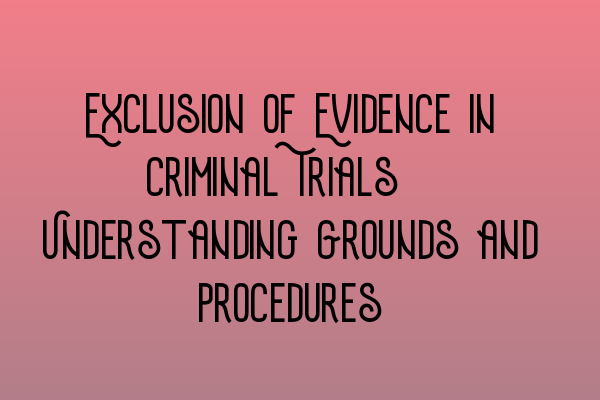Exclusion of Evidence in Criminal Trials: Understanding Grounds and Procedures
Welcome to SQE Criminal Law & Practice Law UK! In this blog post, we will explore the topic of exclusion of evidence in criminal trials. The exclusion of evidence is a crucial aspect of the criminal justice system as it ensures fairness and upholds the rule of law. Understanding the grounds and procedures for excluding evidence is essential for both solicitors and defendants.
The Importance of Excluding Evidence
Excluding evidence is necessary to prevent the admission of unlawfully obtained or unreliable evidence. The inclusion of such evidence can seriously undermine the integrity of the trial and jeopardize the defendant’s right to a fair trial. The exclusion of evidence also serves to maintain public confidence in the justice system.
Grounds for Exclusion
There are various grounds for excluding evidence in criminal trials:
- Illegally Obtained Evidence: Evidence obtained through illegal searches, seizures, or other violations of the accused’s rights can be excluded. This ensures that law enforcement follows proper procedures and respects individuals’ constitutional rights.
- Unreliable Evidence: Evidence that is deemed unreliable or lacking credibility can be excluded. This includes hearsay evidence, evidence obtained through coercion or duress, or evidence based on unreliable scientific methods.
- Violations of Privilege: Certain types of evidence enjoy legal privileges, such as attorney-client privilege or doctor-patient confidentiality. If these privileges are violated, the evidence may be excluded.
- Procedural Irregularities: Evidence obtained through procedural irregularities, such as failure to provide proper notice or obtain necessary warrants, may be excluded. This ensures that the trial proceeds fairly and in accordance with established legal procedures.
Procedures for Excluding Evidence
The procedures for excluding evidence in criminal trials vary depending on the jurisdiction and applicable laws. In general, the party seeking the exclusion of evidence must file a motion with the court, clearly articulating the grounds for exclusion. The opposing party has the opportunity to respond to the motion, presenting counterarguments or justifications for the admissibility of the evidence. The court then evaluates the motion and makes a ruling, taking into account the relevant legal principles and precedents.
It is important for solicitors to have a thorough understanding of the procedural requirements and statutory provisions pertaining to the exclusion of evidence in criminal trials. This knowledge enables them to effectively advocate for their clients and protect their rights.
Conclusion
In conclusion, the exclusion of evidence plays a vital role in the criminal justice system. It ensures that only legally obtained and reliable evidence is considered during trials, safeguarding the fairness and integrity of the proceedings. Solicitors must be well-versed in the grounds and procedures for excluding evidence to provide effective representation for their clients.
If you found this article informative, you may also be interested in reading:
- Demystifying the Solicitors Qualifying Examination Format
- LLC Formation Made Simple: Step-by-Step Guide for UK Entrepreneurs
- LLC Formation: A Step-by-Step Guide for UK Entrepreneurs
- Business Regulations in the UK: A Comprehensive Overview
- Ethical Considerations in UK Law: Upholding Professional Standards
